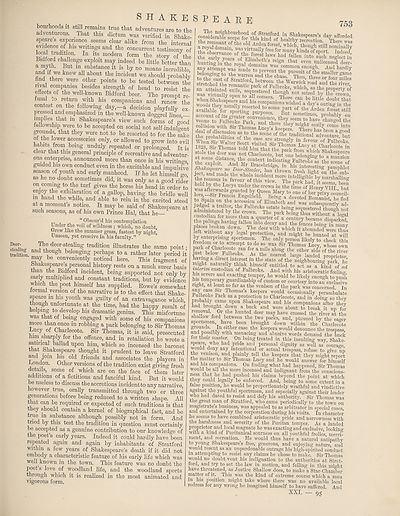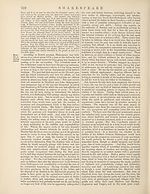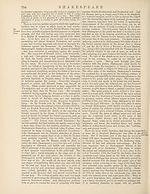Encyclopaedia Britannica > Volume 21, ROT-Siam
(763) Page 753
Download files
Complete book:
Individual page:
Thumbnail gallery: Grid view | List view

bourhoods it still remains true that adventures are to the
adventurous. That this dictum was verified in Shake
speares experience seems clear alike from the internal
evidence of his writings and the concurrent testimony of
local tradition. In its modern form the story of the
Bidford challenge exploit may indeed be little better than
a myth. But m substance it is by no means incredible
and if we knew all about the incident we should probably
find there were other points to be tested between the
rival companies besides strength of head to resist the
effects of the well-known Bidford beer. The prompt re¬
fusal to return with his companions and renew the
contest on the following day,—a decision playfully ex¬
pressed and emphasized in the well-known doggrel lines
implies that in Shakespeare’s view such forms of good
fellowship were to be accepted on social not self-indufient
grounds, that they were not to be resorted to for the ?ake
of the lower accessories only, or allowed to grow into evil
habits from being unduly repeated or prolonged. It is
clear that this general principle of recreative and adventur¬
ous enterprise, announced more than once in his writings
guided his own conduct even in the excitable and impulsive
season of youth and early manhood. If he let himself go
as he no doubt sometimes did, it was only as a good rider
on coming to the turf gives the horse his head in order to
enjoy the exhilaration of a gallop, having the bridle well
in hand the while, and able to rein in the excited steed
at a moments notice. It may be said of Shakespeare at
such seasons, as of his own Prince Hal, that he—
SHAKESPEARE
753
.Obscur’d his contemplation
Under the veil of wildness ; which, no doubt,
Grew like the summer grass, fastest by ni<dit
Unseen, yet crescive in his faculty.”
Deer- The deer-stealing tradition illustrates the same point •
tradition and t^0Ugl1 belo.nging perhaps to a rather later period it
‘ may be conveniently noticed here. This fragment of
Shakespeare’s personal history rests on a much surer basis
than the Bidford incident, being supported not only by
early multiplied and constant traditions, but by evidence
which the poet himself has supplied. Rowe’s somewhat
formal version of the narrative is to the effect that Shake¬
speare in his youth was guilty of an extravagance which,
though unfortunate at the time, had the happy result of
helping to develop his dramatic genius. This misfortune
was that of being engaged with some of his companions
more than once m robbing a park belonging to Sir Thomas
Lucy of Charlecote. Sir Thomas, it is said, prosecuted
him sharply for the offence, and in retaliation he wrote a
satirical ballad upon him, which so incensed the baronet
that Shakespeare thought it prudent to leave Stratford
and join his old friends and associates the players in
London. Other versions of the tradition exist giving fresh
details, some of which are on the face of them later
additions of a fictitious and fanciful kind. But it would
be useless to discuss the accretions incident to any narrative
however true, orally transmitted through two or three
generations before being reduced to a written shape. All
that can be required or expected of such traditions is that
they should contain a kernel of biographical fact, and be
true in substance although possibly not in form. And
tried by this test the tradition in question must certainly
be accepted as a genuine contribution to our knowledge of
the poet’s early years. Indeed it could hardly have been
repeated again and again by inhabitants of Stratford
within a few years of Shakespeare’s death if it did not
embody a characteristic feature of his early life which was
well known in the town. This feature was no doubt the
poet’s love of woodland life, and the woodland sports
through which it is realized in the most animated and
vigorous form.
MPPH
z ofJre smfer
th% t
collision ,,itl. Sir Thomas Ws ktt TTfV0'”0 T
Shakespeare no Deer-StJlZ, h"s tit*1 fKshToftn’Hitsnb4
the tso^fn ^
was*1 ft tIle aUCys un aei the erown in the time of Henry Yin ’but
. °n the accession of Elizabeth and was subsecmentlv ad
places broken down. The deer with which it abounded were thus
left without any legal protection, and might be hunted at will
y enterprising sportsmen. The only person likely to check this
freedom or to attempt to do so was Sii Thomas Lucy, whoso own
prk of Charlecote ran for a mile along the other side of the river
just below Fulbroke. As the nearest large landed proprietor
laving a direct interest in the state of the neighbouring park he’
might naturally think himself entitled to act as a kind of ad
intenm custodian of Fulbroke. And with his aristocratic feeling
his severe and exacting temper, he would be likely enough to push
r/eht^t'least ffdiansbip of or courtesy into an exclusive
£ht’ * £ * far t}!e venison of the park was concerned. In
S i S11' Thomas s keepers would occasionally perambulate
Paik aS a 1>ro1tefitl0n t0 Charlecote, and in doing so they
probably came upon Shakespeare and his companions after they
had brought down a buck and were about to break it up for
removah Or the hunted deer may have crossed the river at the
shallow ford between the two parks, and, pursued by the eager
sportsmen have been brought down within the Charlecote
grounds. In either case the keepers would denounce the trespass
and possibly with menacing and abusive words demand the buck
for their master. On being treated in this insulting way, Shake-
speare, who had pride and personal dignity as well as courage
would deny any intentional or actual trespass, refuse to give up
the venison, and plainly tell the keepers that they might report
the matter to Sir Thomas Lucy and he would answer for himself
and his compamons. On finding what had happened, Sir Thomas
would be al! the more incensed and indignant from the conscious¬
ness that he had pushed his claims beyond the point at which
they could legally be enforced. And, being to some extent in a
false position, he would be proportionately wrathful and vindictive
agarnst the youthful sportsmen, and especially against their leader
who had dared to resist and defy his authority. Sir Thomas was
the great man of Stratford, who came periodically to the town on
magistrate’s business, was appealed to as arbitrator in special cases
and entertained by the corporation during his visits. In character
he seems to have combined aristocratic pride and narrowness with
the harshness and severity of the Puritan temper. As a landed
proprietor and local magnate he was exacting and exclusive, looking
with a kind of Puritanical sourness on all youthful frolics, merri¬
ment, and recreation. He would thus have a natural antipathy
to young Shakespeare’s free, generous, and enjoying nature, and
would resent as an unpardonable outrage his high-spirited conduct
m attempting to resist any claims he chose to make. Sir Thomas
would no doubt vent his indignation to the authorities at Strat¬
ford, and try to set the law in motion, and failing in this miobt
have threatened, as Justice Shallow does, to make a Star-Chamber
matter of it. . This was the kind of extreme course which a man
in his position might take where there was no available local
redress for any wrong he imagined himself to have suffered And
XXL - 95
adventurous. That this dictum was verified in Shake
speares experience seems clear alike from the internal
evidence of his writings and the concurrent testimony of
local tradition. In its modern form the story of the
Bidford challenge exploit may indeed be little better than
a myth. But m substance it is by no means incredible
and if we knew all about the incident we should probably
find there were other points to be tested between the
rival companies besides strength of head to resist the
effects of the well-known Bidford beer. The prompt re¬
fusal to return with his companions and renew the
contest on the following day,—a decision playfully ex¬
pressed and emphasized in the well-known doggrel lines
implies that in Shakespeare’s view such forms of good
fellowship were to be accepted on social not self-indufient
grounds, that they were not to be resorted to for the ?ake
of the lower accessories only, or allowed to grow into evil
habits from being unduly repeated or prolonged. It is
clear that this general principle of recreative and adventur¬
ous enterprise, announced more than once in his writings
guided his own conduct even in the excitable and impulsive
season of youth and early manhood. If he let himself go
as he no doubt sometimes did, it was only as a good rider
on coming to the turf gives the horse his head in order to
enjoy the exhilaration of a gallop, having the bridle well
in hand the while, and able to rein in the excited steed
at a moments notice. It may be said of Shakespeare at
such seasons, as of his own Prince Hal, that he—
SHAKESPEARE
753
.Obscur’d his contemplation
Under the veil of wildness ; which, no doubt,
Grew like the summer grass, fastest by ni<dit
Unseen, yet crescive in his faculty.”
Deer- The deer-stealing tradition illustrates the same point •
tradition and t^0Ugl1 belo.nging perhaps to a rather later period it
‘ may be conveniently noticed here. This fragment of
Shakespeare’s personal history rests on a much surer basis
than the Bidford incident, being supported not only by
early multiplied and constant traditions, but by evidence
which the poet himself has supplied. Rowe’s somewhat
formal version of the narrative is to the effect that Shake¬
speare in his youth was guilty of an extravagance which,
though unfortunate at the time, had the happy result of
helping to develop his dramatic genius. This misfortune
was that of being engaged with some of his companions
more than once m robbing a park belonging to Sir Thomas
Lucy of Charlecote. Sir Thomas, it is said, prosecuted
him sharply for the offence, and in retaliation he wrote a
satirical ballad upon him, which so incensed the baronet
that Shakespeare thought it prudent to leave Stratford
and join his old friends and associates the players in
London. Other versions of the tradition exist giving fresh
details, some of which are on the face of them later
additions of a fictitious and fanciful kind. But it would
be useless to discuss the accretions incident to any narrative
however true, orally transmitted through two or three
generations before being reduced to a written shape. All
that can be required or expected of such traditions is that
they should contain a kernel of biographical fact, and be
true in substance although possibly not in form. And
tried by this test the tradition in question must certainly
be accepted as a genuine contribution to our knowledge of
the poet’s early years. Indeed it could hardly have been
repeated again and again by inhabitants of Stratford
within a few years of Shakespeare’s death if it did not
embody a characteristic feature of his early life which was
well known in the town. This feature was no doubt the
poet’s love of woodland life, and the woodland sports
through which it is realized in the most animated and
vigorous form.
MPPH
z ofJre smfer
th% t
collision ,,itl. Sir Thomas Ws ktt TTfV0'”0 T
Shakespeare no Deer-StJlZ, h"s tit*1 fKshToftn’Hitsnb4
the tso^fn ^
was*1 ft tIle aUCys un aei the erown in the time of Henry Yin ’but
. °n the accession of Elizabeth and was subsecmentlv ad
places broken down. The deer with which it abounded were thus
left without any legal protection, and might be hunted at will
y enterprising sportsmen. The only person likely to check this
freedom or to attempt to do so was Sii Thomas Lucy, whoso own
prk of Charlecote ran for a mile along the other side of the river
just below Fulbroke. As the nearest large landed proprietor
laving a direct interest in the state of the neighbouring park he’
might naturally think himself entitled to act as a kind of ad
intenm custodian of Fulbroke. And with his aristocratic feeling
his severe and exacting temper, he would be likely enough to push
r/eht^t'least ffdiansbip of or courtesy into an exclusive
£ht’ * £ * far t}!e venison of the park was concerned. In
S i S11' Thomas s keepers would occasionally perambulate
Paik aS a 1>ro1tefitl0n t0 Charlecote, and in doing so they
probably came upon Shakespeare and his companions after they
had brought down a buck and were about to break it up for
removah Or the hunted deer may have crossed the river at the
shallow ford between the two parks, and, pursued by the eager
sportsmen have been brought down within the Charlecote
grounds. In either case the keepers would denounce the trespass
and possibly with menacing and abusive words demand the buck
for their master. On being treated in this insulting way, Shake-
speare, who had pride and personal dignity as well as courage
would deny any intentional or actual trespass, refuse to give up
the venison, and plainly tell the keepers that they might report
the matter to Sir Thomas Lucy and he would answer for himself
and his compamons. On finding what had happened, Sir Thomas
would be al! the more incensed and indignant from the conscious¬
ness that he had pushed his claims beyond the point at which
they could legally be enforced. And, being to some extent in a
false position, he would be proportionately wrathful and vindictive
agarnst the youthful sportsmen, and especially against their leader
who had dared to resist and defy his authority. Sir Thomas was
the great man of Stratford, who came periodically to the town on
magistrate’s business, was appealed to as arbitrator in special cases
and entertained by the corporation during his visits. In character
he seems to have combined aristocratic pride and narrowness with
the harshness and severity of the Puritan temper. As a landed
proprietor and local magnate he was exacting and exclusive, looking
with a kind of Puritanical sourness on all youthful frolics, merri¬
ment, and recreation. He would thus have a natural antipathy
to young Shakespeare’s free, generous, and enjoying nature, and
would resent as an unpardonable outrage his high-spirited conduct
m attempting to resist any claims he chose to make. Sir Thomas
would no doubt vent his indignation to the authorities at Strat¬
ford, and try to set the law in motion, and failing in this miobt
have threatened, as Justice Shallow does, to make a Star-Chamber
matter of it. . This was the kind of extreme course which a man
in his position might take where there was no available local
redress for any wrong he imagined himself to have suffered And
XXL - 95
Set display mode to:
![]() Universal Viewer |
Universal Viewer | ![]() Mirador |
Large image | Transcription
Mirador |
Large image | Transcription
Images and transcriptions on this page, including medium image downloads, may be used under the Creative Commons Attribution 4.0 International Licence unless otherwise stated. ![]()
| Encyclopaedia Britannica > Encyclopaedia Britannica > Volume 21, ROT-Siam > (763) Page 753 |
|---|
| Permanent URL | https://digital.nls.uk/193637198 |
|---|
| Attribution and copyright: |
|
|---|---|
| Shelfmark | EB.17 |
|---|---|
| Description | Ten editions of 'Encyclopaedia Britannica', issued from 1768-1903, in 231 volumes. Originally issued in 100 weekly parts (3 volumes) between 1768 and 1771 by publishers: Colin Macfarquhar and Andrew Bell (Edinburgh); editor: William Smellie: engraver: Andrew Bell. Expanded editions in the 19th century featured more volumes and contributions from leading experts in their fields. Managed and published in Edinburgh up to the 9th edition (25 volumes, from 1875-1889); the 10th edition (1902-1903) re-issued the 9th edition, with 11 supplementary volumes. |
|---|---|
| Additional NLS resources: |
|

